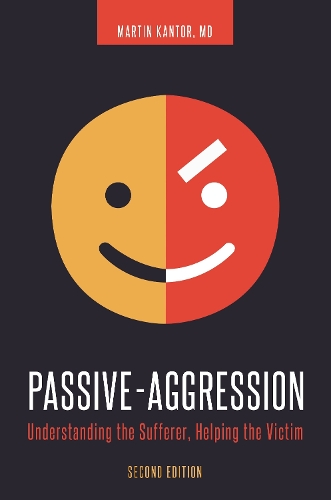
Passive-Aggression: Understanding the Sufferer, Helping the Victim
(Hardback, 2nd edition)
Publishing Details
Passive-Aggression: Understanding the Sufferer, Helping the Victim
By (Author) Martin Kantor MD
Bloomsbury Publishing PLC
Praeger Publishers Inc
3rd October 2017
2nd edition
United States
Classifications
Tertiary Education
Non Fiction
616.858
Winner of 2019 IPPY Award Bronze Medal in Psychology/Mental Health Category 2019
Physical Properties
Hardback
296
Width 156mm, Height 235mm
652g
Description
Passive Aggressive Personality Disorder (PAPD) is now recognized as a distinct personality disorder. Those who suffer from PAPD are sorely in need not only of diagnostic recognition, but also of specific therapeutic intervention. This new book from Martin Kantor speaks to therapists; guides those who interact with passive-aggressive individuals to advance their own effective coping methods based on science, understanding, and compassion; and directly addresses passive-aggressive individuals themselves. Contrary to what is implied in the American Psychiatric Association's Diagnostic and Statistical Manual of Mental Disorders, Fifth Edition (DSM-5), and what some practitioners have believed in recent years, new thinking points to passive-aggression being a full disorder. A counterrevolution is now occurring, with some of the most centrist of authors participating in a concerted drive to bring back the diagnosis as being one of the fundamental personality disordersindeed, a disorder that describes individuals with a distinctly troublesome personality. In this new book, Martin Kantora Harvard-trained psychiatrist and noted author of numerous medical textstakes a new look at passive-aggression and passive-aggressive personality disorder (PAPD) that precisely and scientifically defines it in terms of description, causality, and therapeutic intervention, all based on recent theoretical findings. Kantor makes a powerful argument that passive-aggression can only be reliably identified by answering three fundamental questions, the answers to which define the disorder: why these patients get so angry; why these patients cannot express their anger directly; and what anger styles they employ to express their aggressions. His examination of passive-aggression, which involves two people enmeshed with each other, logically takes two distinct points of view: that of the passive-aggressive individual, and that of his or her "victim" or "target." Specific clinical observation is presented to clarify theory. The book explains how passive-aggression can develop into a complex dyadic interaction in which it is difficult to determine who is doing what to whom, who started it, and what path to take to deescalate; and how using mutual understanding and healthy empathy plus compassion can preclude getting involved in sadomasochistic mutual provocation. The author also suggests ways for those who suffer from passive-aggression to be less hypersensitive, and to express what hypersensitivity they can't help feeling more directly, rather than via the various unhealthy anger styles that constitute the passive-aggressive modus operandi.
Author Bio
Martin Kantor, MD, is a Harvard-trained psychiatrist who has been in full private practice in Boston and New York City and active in residency training programs at hospitals including Massachusetts General in Boston, MA, and Beth Israel in New York, NY.
